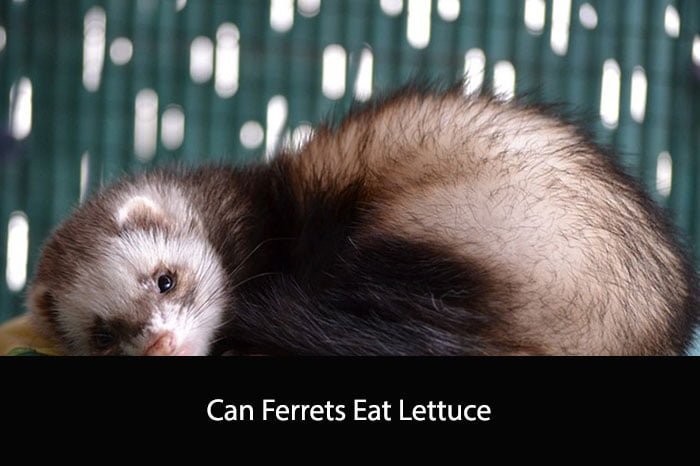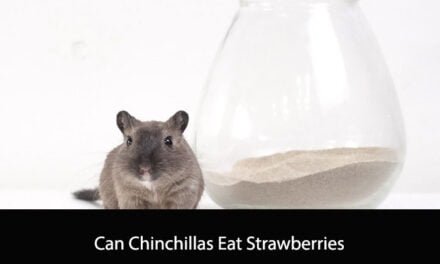Ferrets are playful and curious creatures that require a balanced diet to maintain their health. As a result, many ferret owners wonder if they can feed their pets with cat treats. While ferrets and cats share some similarities in their dietary needs, it is important to understand the differences between the two animals before introducing any new food items.
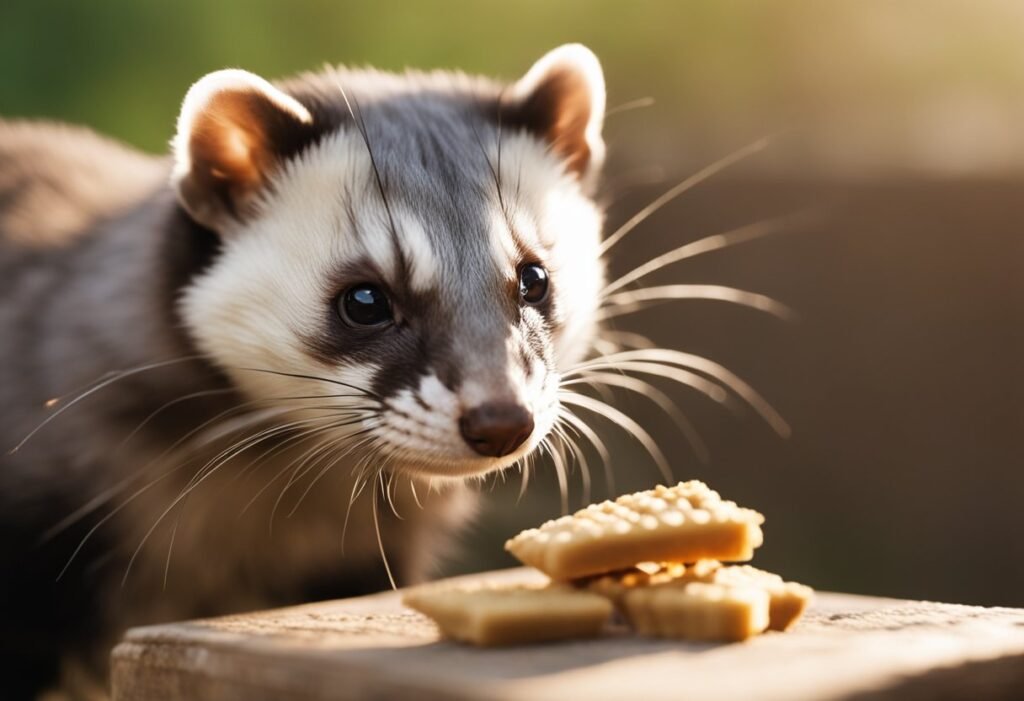
Cat treats are formulated to meet the nutritional needs of cats, and they may contain ingredients that are not suitable for ferrets. Ferrets have a high metabolism and require a diet that is high in protein and fat, with limited amounts of carbohydrates. On the other hand, many cat treats are high in carbohydrates and may not provide the necessary nutrients that ferrets need to thrive. Therefore, it is crucial to choose treats that are specifically made for ferrets or to consult with a veterinarian before introducing any new food items to their diet.
Can Ferrets Eat Cat Treats
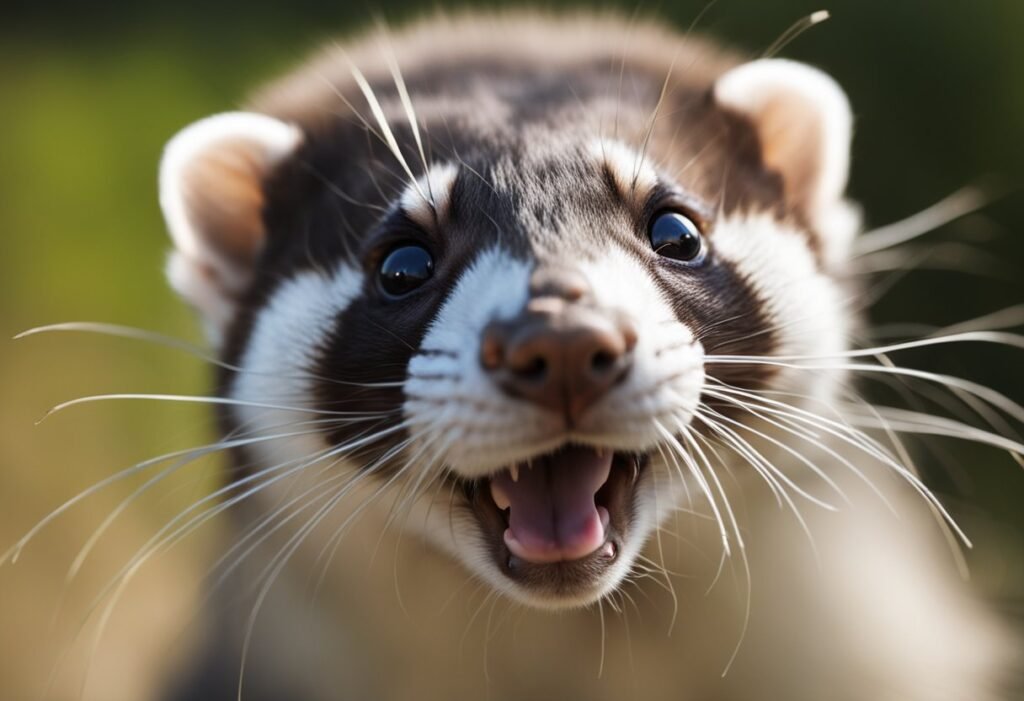
Ferrets are obligate carnivores, meaning they require a diet high in animal protein to maintain their health. While cat treats may seem like a convenient option for ferret owners, it is important to consider their nutritional needs before offering them.
Most cat treats contain ingredients that are not suitable for ferrets, such as grains, vegetables, and fruits. These ingredients can cause digestive issues, such as diarrhea and vomiting, in ferrets. Additionally, some cat treats may contain artificial preservatives and flavors that can be harmful to ferrets.
It is recommended that ferret owners stick to treats specifically formulated for ferrets, which are available at most pet stores. These treats are made with high-quality animal protein and do not contain any harmful ingredients. Some examples of ferret treats include freeze-dried meat, raw bones, and high-protein kibble.
In conclusion, while it may be tempting to offer cat treats to ferrets, it is important to prioritize their nutritional needs. Ferret-specific treats are a safer and healthier option for these obligate carnivores.
Ferret Dietary Basics
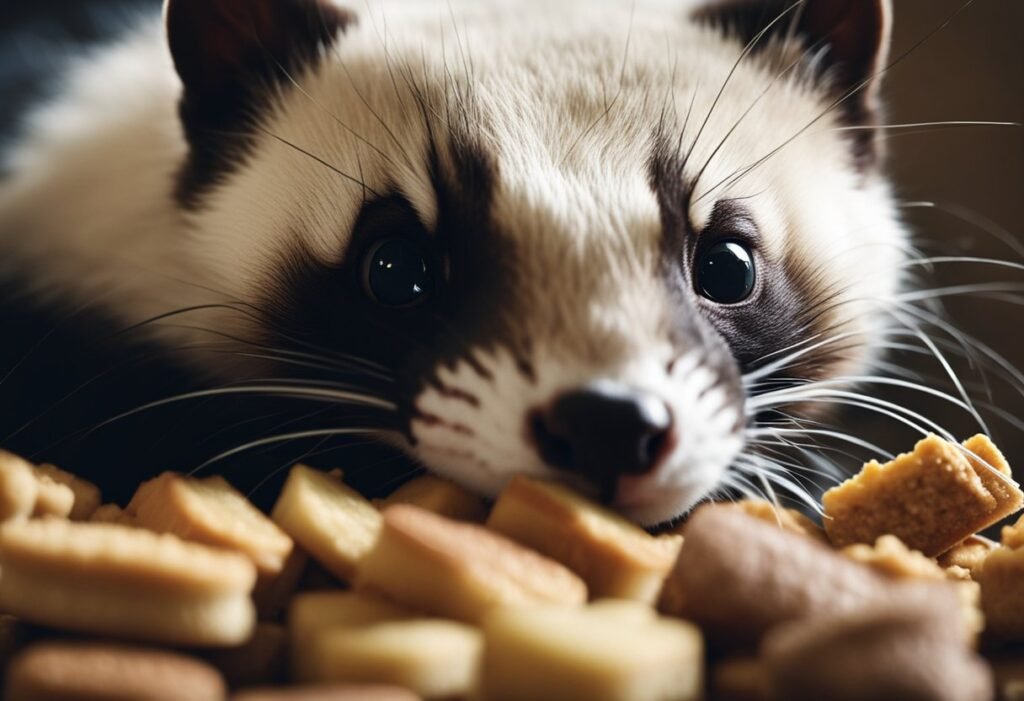
Nutritional Requirements
Ferrets are obligate carnivores, which means that their diet should primarily consist of meat. They require a high protein diet with moderate amounts of fat and minimal amounts of carbohydrates. Ferrets also need a constant supply of water to maintain their health.
In addition to protein, ferrets require certain vitamins and minerals to stay healthy. Some of the essential nutrients that ferrets need include:
- Vitamin A
- Vitamin D
- Vitamin E
- Zinc
- Copper
- Iron
- Taurine
Differences Between Ferret and Cat Diets
While ferrets and cats are both carnivores, their dietary needs are different. Ferrets require a higher protein diet than cats, and they cannot digest carbohydrates as effectively. Ferrets also require a higher fat diet than cats.
It is important to note that not all cat treats are suitable for ferrets. Some cat treats may contain ingredients that are harmful to ferrets, such as grains or vegetables. It is always best to check the ingredients list before feeding your ferret any cat treats.
In summary, ferrets require a high protein, moderate fat, and low carbohydrate diet. While they may enjoy some cat treats, it is important to ensure that the treats are safe for ferrets to consume.
Safety of Cat Treats for Ferrets
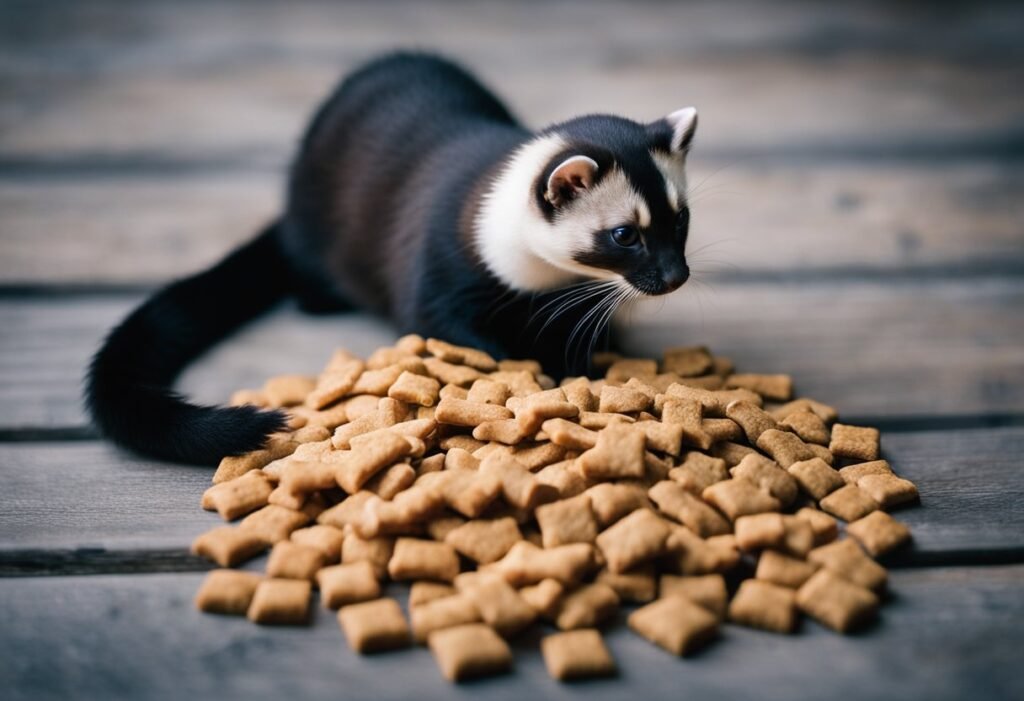
When it comes to feeding ferrets, it’s important to be cautious about what they eat. While ferrets have different dietary requirements than cats, many ferret owners wonder if it’s safe to feed their pets cat treats. Here’s what you need to know.
Ingredients to Avoid
First and foremost, it’s essential to avoid feeding your ferret any cat treats that contain ingredients that are harmful to them. Some common ingredients to avoid include:
- Onion and garlic: These can cause anemia in ferrets.
- Chocolate: This contains theobromine, which is toxic to ferrets.
- Raisins and grapes: These can cause kidney failure in ferrets.
- Xylitol: This is a sweetener that can be toxic to ferrets.
Make sure to read the ingredient list carefully before giving your ferret any cat treats. If you’re unsure about whether a particular ingredient is safe for your ferret, it’s best to err on the side of caution and avoid it altogether.
Possible Health Concerns
While many cat treats are safe for ferrets to eat in moderation, it’s important to be aware of the potential health concerns that can arise from overfeeding. Some possible health issues include:
- Obesity: Ferrets are prone to obesity, so it’s important to monitor their calorie intake and avoid giving them too many treats.
- Dental problems: Some cat treats are high in sugar and can contribute to dental problems in ferrets.
- Digestive issues: Ferrets have sensitive digestive systems, so feeding them too many treats can cause diarrhea or other digestive issues.
Overall, it’s important to be mindful of what you’re feeding your ferret and to avoid overfeeding them treats. While many cat treats are safe for ferrets to eat in moderation, it’s always best to check with your veterinarian before introducing any new foods into your ferret’s diet.
Benefits of Cat Treats for Ferrets
Ferrets are obligate carnivores, which means they require a diet that is high in protein and fat. While ferret-specific treats are available, cat treats can also be a good option for ferrets. Here are some benefits of feeding cat treats to ferrets:
1. High in Protein
Cat treats are typically made with high-quality protein sources such as chicken, fish, or beef. Ferrets require a diet that is at least 32% protein, and cat treats can help supplement their protein intake.
2. Variety of Flavors
Cat treats come in a variety of flavors, which can help prevent ferrets from getting bored with their diet. However, it’s important to note that not all flavors are safe for ferrets. Avoid treats that contain onion, garlic, or other harmful ingredients.
3. Convenient and Affordable
Cat treats are widely available and often less expensive than ferret-specific treats. They can be found at most pet stores, grocery stores, and online retailers.
It’s important to remember that cat treats should not make up a large portion of a ferret’s diet. They should be given in moderation as a supplement to their regular diet of high-quality ferret food. As with any new food, it’s important to introduce cat treats slowly and monitor your ferret’s reaction. If your ferret experiences any digestive issues or allergic reactions, discontinue use immediately.
Choosing the Right Cat Treats for Ferrets
When it comes to treating your ferret, it’s important to choose the right cat treats that are both safe and healthy for them. Here are a few factors to consider when selecting cat treats for ferrets:
Protein Content
Ferrets are obligate carnivores, which means that they require a diet that is high in protein and low in carbohydrates. When choosing cat treats for ferrets, it’s important to look for products that have a high protein content. Treats that are made with real meat, such as chicken, turkey, or fish, are a good option. Avoid treats that are high in carbohydrates, such as those that contain grains or vegetables, as these can upset your ferret’s digestive system.
Treat Texture and Size
Ferrets have small digestive systems, so it’s important to choose cat treats that are small and easy to digest. Look for treats that are bite-sized or that can be easily broken into smaller pieces. Avoid treats that are too hard or crunchy, as these can be difficult for ferrets to chew and may cause dental problems. Soft and chewy treats are a better option.
In summary, when choosing cat treats for ferrets, it’s important to consider the protein content and the texture and size of the treats. By selecting treats that are high in protein and easy to digest, you can ensure that your ferret stays healthy and happy.
Feeding Guidelines
Frequency of Treats
When it comes to feeding ferrets, treats should be given in moderation. It is recommended that cat treats should only be given to ferrets once or twice a week. This is because cat treats are not formulated specifically for ferrets and may contain ingredients that are not suitable for their digestive system.
Portion Control
Portion control is important when feeding ferrets any type of treat, including cat treats. A good rule of thumb is to give no more than 1-2 treats per day, and each treat should not exceed 5% of the ferret’s daily food intake. Overfeeding treats can lead to obesity and other health problems, so it is important to monitor the amount of treats given to your ferret.
When feeding cat treats to ferrets, it is important to check the ingredients list for any harmful or toxic ingredients. Some cat treats may contain high levels of sugar, salt, or preservatives that can be harmful to ferrets. Additionally, some cat treats may contain ingredients that ferrets are allergic to, so it is important to introduce new treats slowly and monitor your ferret’s reaction.
Overall, while cat treats can be given to ferrets in moderation, it is important to prioritize their health and well-being by feeding them a balanced diet and limiting the amount of treats given.
Alternatives to Cat Treats
If you’re looking for alternatives to cat treats for your ferret, there are a variety of options available. Here are two categories of treats that are suitable for ferrets:
Ferret-Specific Treats
Ferrets have different nutritional needs than cats, so it’s important to choose treats that are specifically formulated for them. There are many brands of ferret treats available, both online and in pet stores. These treats are designed to provide the right balance of protein, fat, and other nutrients that your ferret needs to stay healthy.
Some popular brands of ferret treats include:
- Marshall’s Premium Ferret Treats
- Bandit’s Ferret Treats
- N-Bone Ferret Chew Treats
When choosing ferret treats, be sure to read the ingredients list carefully. Look for treats that are high in protein and low in carbohydrates, as ferrets are obligate carnivores and require a diet that is high in animal protein.
Natural Snack Options
If you prefer to give your ferret natural snacks, there are many options to choose from. Here are a few ideas:
- Raw or cooked meat: Ferrets love meat, so consider giving them small pieces of raw or cooked chicken, turkey, or beef as a treat.
- Raw or cooked eggs: Eggs are another great source of protein for ferrets. You can give them a small piece of scrambled egg or a hard-boiled egg as a treat.
- Freeze-dried meat: Many pet stores carry freeze-dried meat treats that are suitable for ferrets. Look for brands that use high-quality, whole-food ingredients.
When giving your ferret natural snacks, be sure to avoid foods that are toxic to ferrets, such as chocolate, caffeine, and raisins. Always supervise your ferret when giving them treats to ensure they don’t choke or swallow something they shouldn’t.
Frequently Asked Questions
What treats are safe for ferrets to consume?
Ferrets are obligate carnivores, which means they require a diet that is high in animal protein and fat. Treats that are safe for ferrets to consume include high-quality cat treats that are made primarily from animal protein. It is important to read the ingredients list and avoid treats that contain grains, vegetables, or fruits, as these are not appropriate for a ferret’s digestive system.
Is it appropriate to feed ferrets wet cat food?
Wet cat food can be a good source of animal protein for ferrets, but it should not be the main component of their diet. Ferrets require a high-protein, high-fat diet that is tailored to their specific nutritional needs. Wet cat food can be used as a supplement to a ferret’s regular diet, but it should not be relied upon as the sole source of nutrition.
What should I feed my ferret in the absence of their regular diet?
In the absence of their regular diet, ferrets can be fed a high-quality kitten food that is high in animal protein and fat. It is important to avoid adult cat food, as this is not appropriate for a ferret’s nutritional needs. Fresh water should always be available for the ferret to drink.
Can ferrets have a diet that includes dog food?
Dog food is not appropriate for ferrets, as it does not provide the specific nutritional needs that ferrets require. Dog food is typically lower in animal protein and fat than cat food, and it may contain ingredients that are not appropriate for a ferret’s digestive system.
Which raw meats are recommended for a ferret’s diet?
Raw meats that are safe for ferrets to consume include chicken, turkey, and rabbit. It is important to ensure that the meat is fresh and free of any harmful bacteria. Raw meat should be fed in moderation and should not be relied upon as the sole source of nutrition.
Are there any human foods that are safe for ferrets to eat?
While there are some human foods that are safe for ferrets to eat, it is important to remember that their digestive system is designed to process animal protein and fat. Safe human foods for ferrets include cooked egg, cooked meat, and small amounts of cooked vegetables. It is important to avoid foods that are high in sugar, salt, or fat, as these can be harmful to a ferret’s health.


